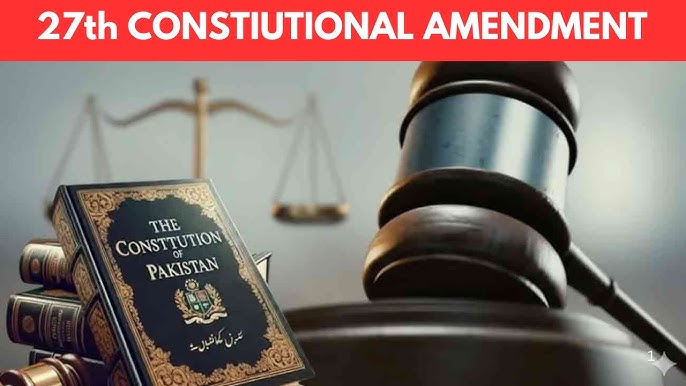The Senate of Pakistan on Monday passed the 27th Constitutional Amendment bill in a contentious session, signalling one of the most far-reaching constitutional overhauls in recent memory for Pakistan. Let’s take a closer look at what the amendment proposes, why it has provoked so much debate, the key players and implications — and what readers should watch next.
What is being changed?
The 27th Amendment seeks to revise several core aspects of Pakistan’s constitutional architecture: the judiciary, the military command structure, federal-provincial relations, and institutional checks and balances. While the full text of the bill is still under discussion, media summaries and analyses highlight the following major components:
1. Creation of a Federal Constitutional Court (FCC)
The 27th Amendment bill proposes establishing a new court — the FCC — with jurisdiction over constitutional interpretation, inter-governmental disputes, and related matters. Under this arrangement, the existing Supreme Court of Pakistan would be relegated to appeals and non-constitutional matters. The FCC would be composed with equal provincial representation, and eligibility criteria for judges (for example length of service) would be adjusted.
2. Amendments to Defence Leadership and Article 243
One of the most visible changes is in the military hierarchy. The 27th Amendment bill proposes revising Article 243 of the Constitution, which currently vests control of the Armed Forces in the federal government and President. Under the new structure, the Chief of Army Staff would assume the role of Chief of Defence Forces, consolidating command across the military services. Titles such as Field Marshal, Marshal of Air Force, Admiral of Fleet are to be given lifetime protection under the new amendment.
3. Judicial Appointments and Transfers
The amendment revises how judges are transferred, how long they must have served in High Courts before elevation, and how the judicial commission and Supreme Judicial Council intervene. For example, a minimum of five years service in a High Court is required to be eligible for the Constitutional Court (instead of seven). As per the proposed 27th Amendment bill, the transfer of a judge from one High Court to another will now go through the Judicial Commission; if the judge refuses, a reference may be made to the Supreme Judicial Council.
4. Provincial Rights & Federal Finances
Observers note the amendment also touches upon the provincial share under the National Finance Commission Award, and suggests a possible review of financing rights that provinces currently enjoy. Some changes imply reduction of provincial autonomy on matters like education and population planning, which had been devolved under previous amendments.
5. Immunity & Executive Accountability
A controversial clause grants lifetime immunity to the President if they assume no other public office after their term. Some critics interpret this as insulating top officeholders from accountability.
Why now? What’s driving this push?

The government argues that this amendment is needed to modernise state institutions, reduce the backlog of constitutional petitions, streamline military command, and enhance national coordination. For instance, the law minister has said that the FCC would allow the Supreme Court to focus on appellate jurisdiction while constitutional matters are handled separately. On the military side, it is argued that changing warfare and security demands call for unified command and clearer constitutional wording.
Additionally, coalition partners — such as the Pakistan Peoples Party — have signalled some conditional support, particularly around Article 243 reforms and constitutional court formation.
The Politics & Voting – Senate Developments
On November 10, the Senate session turned rowdy as opposition senators protested and ultimately boycotted the vote. The 27th Amendment bill was presented by Law Minister Azam Nazeer Tarar and passed with 64 votes in favour in the 96-member house, reaching the required two-thirds majority. No senator voted against it; the opposition opted to stay away. The bill now moves to the National Assembly for voting.
In Senate debate, senior figures such as PPP Senator Farooq H. Naek presented a report of the joint parliamentary committee which had made some “tweaks” to the 27th Amendment draft approved by the federal cabinet. Opposition senators voiced grave concerns about erosion of provincial rights and democratic structure.
Supporters vs Critics – A Clash of Narratives on 27th Amendment
Supporters argue:
-
The amendment brings much-needed institutional clarity: separating constitutional and appellate work, modernising military command, speeding up justice
-
It strengthens parliament by giving it more say in judicial and military appointments
-
It improves efficiency by reducing the burden on the Supreme Court and creating a specialised court
-
It aligns Pakistan’s constitutional framework with evolving security and governance realities
Critics contend:
-
The amendment undermines judicial independence by creating a court whose judges may be more influenced by the executive/legislature
-
It weakens provincial autonomy and federalism, reversing gains of the 18th Amendment
-
It centralises power in the military and executive, raising concerns about democratic checks
-
The process itself lacked meaningful consultation and consensus
Some critics have summarised the worry like this: the amendment seems designed to reward some, punish others, and ensure no “unfriendly” judge is elevated.
What this means for Pakistan
The passing of the 27th Amendment (once fully enacted) would mark a paradigm shift in Pakistan’s constitutional order and civil-military relations. Key implications include:
-
Shift in judicial architecture and balance of power: The Supreme Court losing primary constitutional-jurisdiction means the entire system of judicial review and rights protection may change shape.
-
Stronger military footprint in governance: A unified command under the army chief elevates the military’s institutional status in governance.
-
Provincial politics & federal structure stress: Provinces may feel their powers retreating, which could reignite centre-periphery tensions especially in smaller or weaker provinces.
-
Precedent for further amendments: If this passes smoothly, it may open the door for further constitutional tweaks.
-
Investor & international observer reactions: Constitutional uncertainty and possible erosion of checks may impact confidence in institutional stability, governance and rule of law.
For everyday citizens, the question is whether this 27th Amendment will translate into better access to justice, faster case resolution, stronger national security — or conversely, less accountability, weaker provincial rights, and increased centralisation.
What to watch next
-
National Assembly vote
-
Presidential assent
-
FCC timeline and staffing
-
Transfer rules for judges
-
Executive orders after amendment is enacted
-
Provincial backlash
-
Legal challenges
Final thoughts
This moment is historic — not only because the Constitution is being amended in the form of 27th Amendment bill, but because the balance of power between judiciary, executive, military command, and provinces may transform all at once.
The most important question is not what the text says — but how Pakistan implements it.
Will the 27th Amendment prove to be the bold modernization Pakistan needed?
Or will it quietly mark a turning-point toward consolidation of power in fewer hands?
Time, and implementation, will tell.



